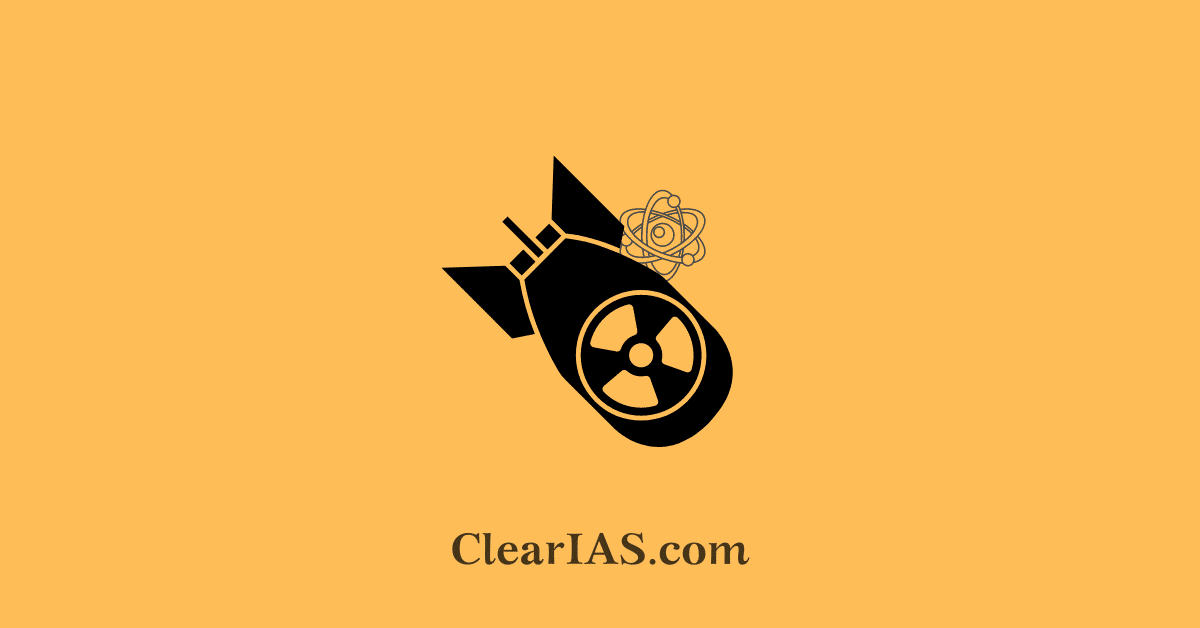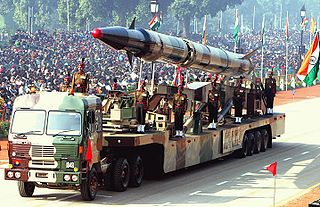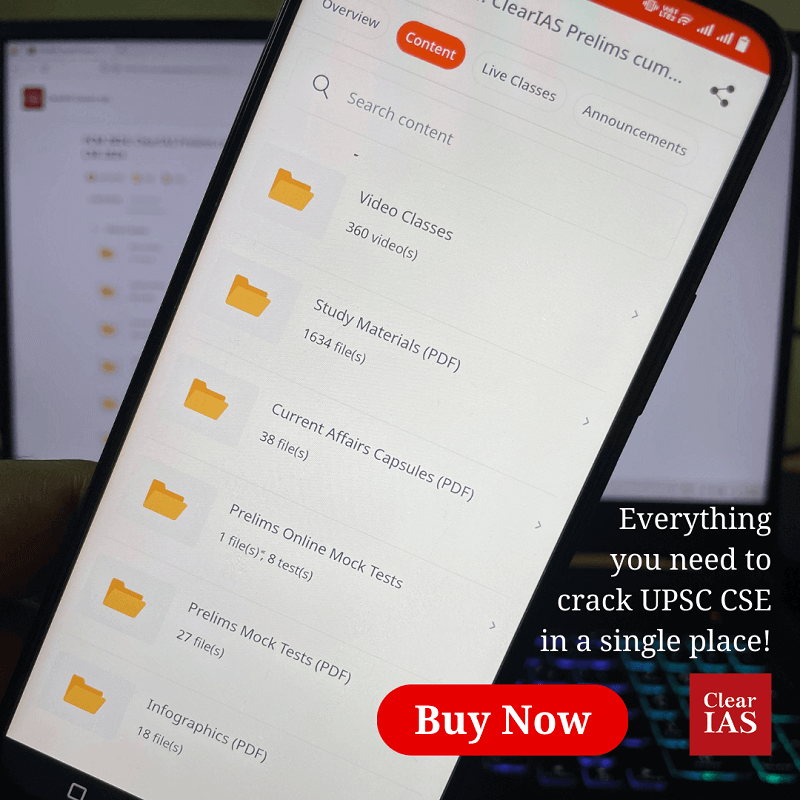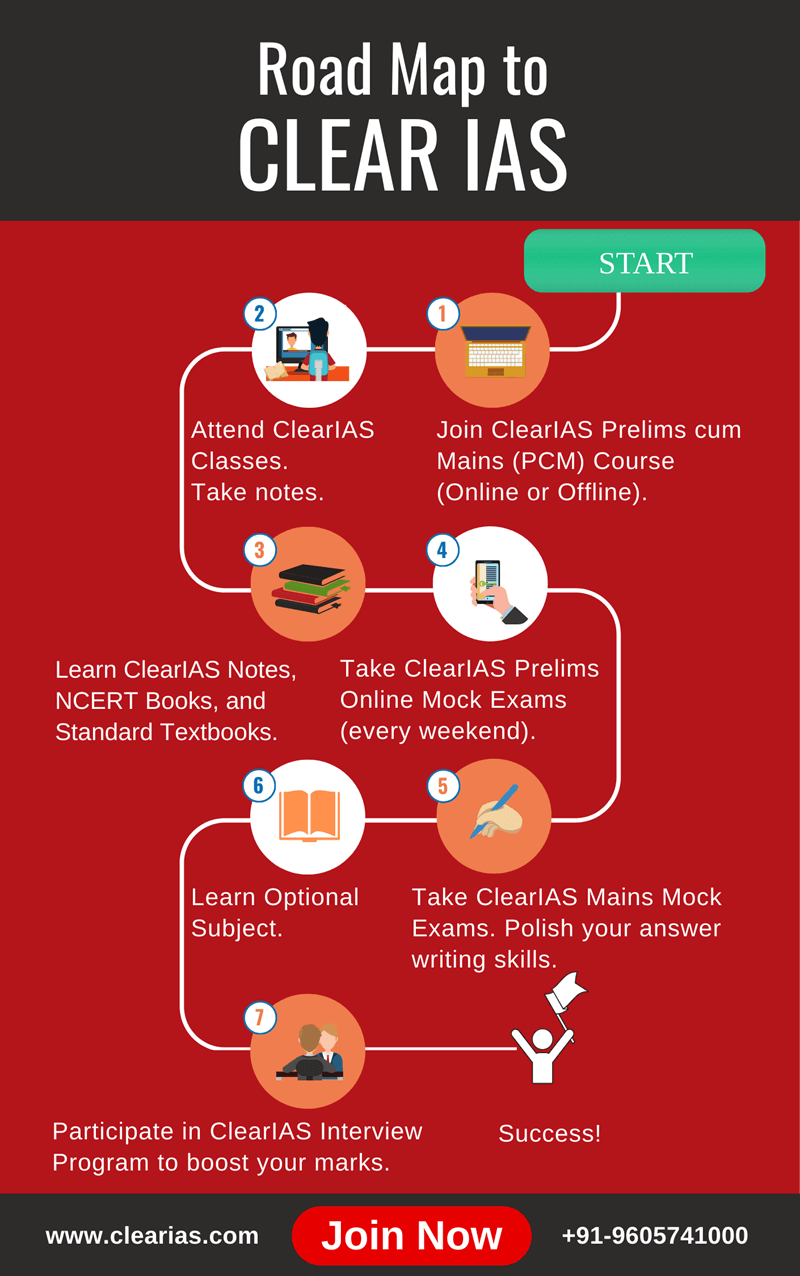
India’s Nuclear Weapon Programme was aimed at the peaceful utilization of atomic energy at a time when the pioneering activities in this field were geared essentially toward military use. Read further to know more about India’s Nuclear Weapon Programme, Nuclear Command Authority (NCA), India’s No-First-Use Policy and Doctrine of Credible Minimum Deterrence (CMD), Nuclear Triad, etc.
India is the only developing nation to have indigenously developed, demonstrated, and deployed nuclear reactors for electricity generation.
Do you know who has his fingers on the nuclear button in India? Prime Minister? Army Chief? What is the role of the Nuclear Command Authority (NCA)? What is Strategic Forces Command or Strategic Nuclear Command?
We hope this post clears your doubts related to India’s external security as we discuss in brief, topics like India’s Nuclear Weapon Program and principles like No First Use and Minimum Credible Deterrence.
History of India’s Nuclear Weapon Programme
India’s nuclear weapon program, officially known as the Indian Nuclear Weapons Program, has its origins in the 1940s and culminated with the successful testing of nuclear weapons in 1998.
On 26 June 1946, Jawaharlal Nehru announced:
As long as the world is constituted as it is, every country will have to devise and use the latest devices for its protection. I have no doubt India will develop her scientific researches and I hope Indian scientists will use the atomic force for constructive purposes. But if India is threatened, she will inevitably try to defend herself by all means at her disposal.
1940s-1950s: Early Developments
- India’s interest in nuclear technology began during the colonial era, and scientific research in nuclear physics gained momentum in the 1940s.
- India’s nuclear program started in March 1944 and its three-stage indigenous efforts in technology were established by Dr. Homi Bhabha when he founded the nuclear research center, the Institute of Fundamental Research.
- The establishment of the Tata Institute of Fundamental Research (TIFR) and the Atomic Energy Commission (AEC) marked significant steps in India’s nuclear research.
1960s-1970s: Peaceful Nuclear Explosions
- India’s loss of territory to China in the war of 1962, provided the New Delhi government impetus for developing nuclear weapons as a means of deterring potential Chinese aggression.
- India conducted its first peaceful nuclear explosion (PNE) in 1974 at the Pokhran Test Range in Rajasthan. This test, codenamed “Smiling Buddha,” marked India’s entry into the global nuclear stage.
- The PNE was presented as a demonstration of India’s nuclear capabilities for peaceful purposes, but it had military implications.
1980s: Shift towards Weaponization
- In the 1980s, India’s nuclear program shifted from a focus on peaceful uses of nuclear technology to military applications.
- Concerns about regional security dynamics, including China’s nuclear capabilities and the proliferation of nuclear weapons, contributed to this shift.
1998: Pokhran-II Tests
- In May 1998, India conducted a series of nuclear tests, known as “Pokhran-II,” (code-named “Operation Shakti”) at the Pokhran Test Range. Five nuclear devices were detonated.
- These tests included both fission and thermonuclear (fusion) devices, showcasing India’s ability to develop a range of nuclear weapons.
India’s No-First-Use Policy and Doctrine of Credible Minimum Deterrence (CMD)
In August 1999, the Indian government released a draft of the doctrine which asserts that nuclear weapons are solely for deterrence and that India will pursue a policy of “retaliation only”.
The document also maintains that India “will not be the first to initiate a nuclear first strike, but will respond with punitive retaliation should deterrence fail” and that decisions to authorize the use of nuclear weapons would be made by the Prime Minister or his ‘designated successor(s).
‘ The doctrine of “No first use” means “no first use against non-nuclear-weapon states”, as clarified by our NSA. The doctrine of “no first use against non-nuclear-weapon states” reflected India’s strategic culture, with its emphasis on minimal deterrence.
India’s nuclear doctrine emphasizes a retaliatory strike capability and NFU. The doctrine also stresses a massive retaliation policy against any nuclear aggression.
Also read: Indian Arms Import
India’s Nuclear Weapon Programme: Main Authorities
Names to remember Nuclear Command Authority (NCA), Strategic Nuclear Command, Cabinet Committee on Security, National Security Advisory Board, etc.
Cabinet Committee on Security (CCS)
The civil leadership, in the form of the CCS (Cabinet Committee on Security), is the only body authorized to order a nuclear strike against another offending strike: In effect, it is the Prime Minister who has his finger “on the button.”
 Nuclear Command Authority (NCA)
Nuclear Command Authority (NCA)
On January 4, 2003, the Cabinet Committee on Security (CCS) constituted the Nuclear Command Authority (NCA). NCA has two councils: the Executive Council and the Political Council.
The Executive Council is chaired by the National Security Advisor (NSA) while the Political Council is chaired by the Prime Minister.
The National Security Advisor gives the inputs to the Political Council, which authorities a nuclear attack when deemed necessary. This mechanism of the Political Council is advised by the Executive Council and letting the “nuclear button remain with PM” was implemented to ensure that Indian nukes remain firmly in civilian control and that there exists a sophisticated Command and Control (C2) mechanism to prevent their accidental or unauthorized use.
Strategic Nuclear Command or Strategic Forces Command

Strategic Nuclear Command, forms part of India’s Nuclear Command Authority (NCA). India’s Strategic Nuclear Command was formally established in 2003.
The Joint Services SNC is the custodian of all of India’s nuclear weapons, missiles, and assets. It is also responsible for executing all aspects of India’s nuclear policy.
The directives of the NCA are to be operationalized by the Strategic Forces Command under the control of a Commander-in-Chief of the rank of Air Marshal (or its equivalent) in charge of the management and administration of the tactical and strategic nuclear forces. (So as it is clear, Strategic Nuclear Command is the implementing agency of the nuclear decision.)
National Security Council (NSC) of India
The National Security Council (NSC) of India is the apex agency looking into the country’s political, economic, energy, and strategic security concerns. (Please note that the NSC has roles beyond nuclear deterrence.
The chief executive is the National Security Adviser. Before the formation of the NSC, these activities were overseen by the Principal Secretary to the Prime Minister).
The three-tiered structure of the NSC comprises the Strategic Policy Group, the National Security Advisory Board, and a Secretariat represented by the Joint Intelligence Committee (JIC).
Also read: India’s Defence Exports
How does Nuclear Deterrence Work in India?
The executive council of the NSA advises the political council of the NSA in case of any security threat or nuclear action needed. The political council gives orders to Strategic Nuclear Command.
Strategic Nuclear Command possesses all major nuclear arsenals, and it is the agency responsible for executing a nuclear retaliation. SNC requires approval from NCA for any nuclear action. Recent estimates suggest that India has between 90 and 110 nuclear weapons.
Nuclear Triad
Nuclear Triad is a term used to denote a nation that has the capabilities of a nuclear strike from land, air, and water. India has tested its abilities on land, air, and sea.
- From Land: Ballistic missiles with a nuclear warhead in the Prithvi and Agni Series.
- From Air: Nuclear bombs from Dassault Mirage 2000s and SEPECAT Jaguars. (Free-falling and un-guided method).
- From Sea: Submarines: Sagarika K-15 missile in Arihant Submarine; Ship: Dhanush missile from ships like INS Subhadra or INS Rajput.
India’s Nuclear Weapon programme: Current status
India has regularly engaged in diplomatic efforts to improve its nuclear standing on the global stage.
- The Indo-US Civil Nuclear Agreement in 2008 allowed for international civilian nuclear trade with India despite its status as a non-signatory of the Nuclear Non-Proliferation Treaty (NPT).
- Developing anti-satellite weapon (ASAT) capabilities; successfully carried out an ASAT missile test in March 2019
- Possesses several types of operational nuclear-capable land-based ballistic missiles, SLBMS, and cruise missiles
- Successfully conducted 11 missile tests in late 2020, including the new naval version of the BrahMos cruise missile and hypersonic Shaurya missile
- On October 14, 2022, India conducted a successful test launch of a submarine-launched ballistic missile (SLBM) from an Arihant-class SSBN.
- As of January 2023, India was estimated to have a growing stockpile of 164 nuclear weapons, a small increase from the previous year’s count of 160. These weapons are assigned to a nuclear triad of aircraft, land-based missiles, and nuclear-powered ballistic missile submarines.
Conclusion
India’s nuclear weapon program has been a subject of debate and discussion both within the country and internationally. While India maintains its nuclear weapons for deterrence purposes and emphasizes its commitment to responsible nuclear behavior, questions about non-proliferation, disarmament and regional security dynamics remain important aspects of the global nuclear landscape.
Read: Mission Divyastra








Good informative article
Its very useful n comprehensive . Thanks
Over all information to strategic of nuclear program for India.
Thanks
really good
NYC explanation….. About admin structure… Thnks for the effort…..